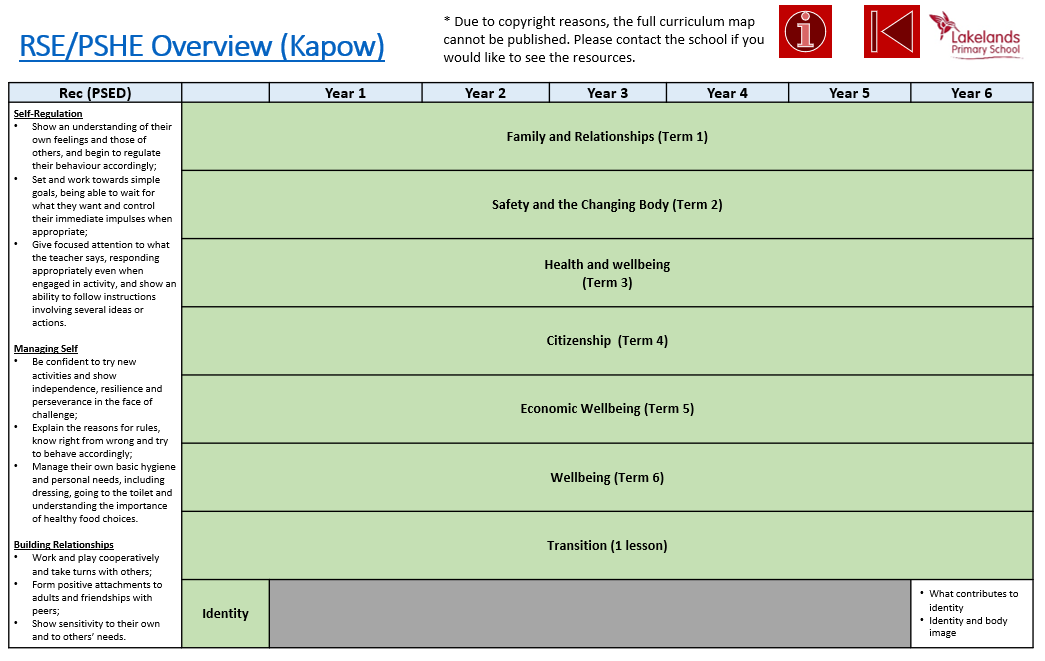- Home
- Curriculum
- Subjects
- Relationships, Sex and Health Education
Relationships, Sex and Health Education
At Lakelands Primary School, we teach our pupils (from Year 1) discrete subjects. This means that we teach pupils what it means to be global citizens. Pupils will understand that in Relationships, Sex (from Year 4) and Health Education, we learn about relationships, keeping physically and mentally healthy, economic wellbeing, and keeping safe.
"Peace cannot be kept by force; it can only be achieved by understanding."
Albert Einstein
Relationships, Sex and Health Education Curriculum Overview

Relationships, Sex and Health Education Knowledge and Skills Coverage
All units of learning in our Relationships, Sex and Health Education curriculum are designed to cover the following key areas:
- Family and relationships
- Health and wellbeing
- Safety and the changing body
- Citizenship
- Economic wellbeing
- Identity (Year 6 only)
Across the school, we teach RSHE to help pupils have a greater understanding of what it means to be a citizen in the modern world.
We use these to support teacher knowledge and improve lessons:
- Kapow Schemes of Work, Long Term Plans and Skills Progression
- PSHE (Personal, Social and Health Education) Association resources
How is Relationships, Sex and Health Education Taught?
Our school culture is underpinned by our Personal Development offer, which can be found here. Our lunchtime provision, extra-curricular club offer and assembly timetable are good examples of the implementation of Personal Development at Lakelands.
There are also number of areas which are also taught discreetly, through RSHE, including keeping safe online, mental health and our relationships with others.
There is a legal duty with which schools must comply when teaching Relationships, Sex and Health (RSHE) Education. At Lakelands, we teach Relationships and Health Education as a discreet subject from Years 1-6, with Relationships and Sex Education being taught from Year 4 (beginning with the changing body). The RSHE Policy can be found here, and has been consulted on with parents.
We use a variety of resources, sourced from Kapow, CBBC and the PSHE Association to deliver age-appropriate lessons, which range from calling emergency services, getting ready from bed and friendship problems in Year 1 to developing respectful relationships, being critical digital consumers and puberty, conception and birth in Year 6.
More information about how puberty and human reproduction is taught using the Kapow curriculum can be found here: April-2023-Parental-slides-RSE-1-1.pdf
Enrichment Opportunities in Relationships, Sex and Health Education
There are various ways in which we enrich the pupils' knowledge and skills beyond individual RSHE lessons:
- Assemblies relating to Personal Development, including keeping safe (including online). Examples of these can be found at the bottom of this page.
- A relationships based behaviour policy, which can be found here.
- Working alongside others in the classroom, across the school and between schools.
- A wide ranging extra-curricular offer
- A whole school curriculum based on Personal Development, and Diversity, Equality and Inclusion, including a dedicated Literature Spine.
Relationships, Sex and Health Education Links with Other Curriculum Areas (including EYFS)
In EYFS, we lay the foundations for RSHE by planning for learning and development opportunities centred around the pupils' specific needs and interests. Adults respond to those needs and interests, guiding their development through warm, positive interactions in an encouraging, stimulating and a well-resourced indoor and outdoor environment.
In EYFS, opportunities are created and pupils are assessed against the following:
Self-Regulation
- Show an understanding of their own feelings and those of others, and begin to regulate their behaviour accordingly;
- Set and work towards simple goals, being able to wait for what they want and control their immediate impulses when appropriate;
- Give focused attention to what the teacher says, responding appropriately even when engaged in activity, and show an ability to follow instructions involving several ideas or actions.
Managing Self
- Be confident to try new activities and show independence, resilience and perseverance in the face of challenge;
- Explain the reasons for rules, know right from wrong and try to behave accordingly;
- Manage their own basic hygiene and personal needs, including dressing, going to the toilet and understanding the importance of healthy food choices.
Building Relationships
- Work and play cooperatively and take turns with others;
- Form positive attachments to adults and friendships with peers;
- Show sensitivity to their own and to others’ needs.
âThere are also close links with:
- Design and Technology (Cooking and Nutrition)
- Physical Education (keeping physically healthy)
- Computing (keeping safe online)
- Science (keeping healthy, the changing body)
- Art (studies of artists from varied backgrounds)
- English (Literature Spine)
Knowledge Organisers
As we use the Kapow RSHE Schemes of Work as the basis of our Relationships, Sex and Health Education curriculum, we cannot share Knowledge Organisers on our website for copyright reasons.

